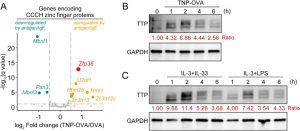A recent study has revealed the pivotal role of tristetraprolin (TTP), an RNA-binding protein, in controlling inflammatory responses in basophils, a type of immune cell central to allergic reactions (Figure 1). The research demonstrates that TTP regulates the stability of mRNAs encoding inflammatory molecules, preventing their overproduction and excessive immune responses. The findings highlight TTP as a potential therapeutic target for allergic and inflammatory diseases such as asthma and atopic dermatitis.

Figure 1: TTP expression is upregulated in basophils following antigen/IgE, IL-33 and LPS stimulation. (A) Freshly isolated bone marrow basophils sensitized with TNP-specific IgE (TNP-IgE) were treated with TNP-conjugated OVA (TNP-OVA) or unconjugated OVA for 4 h and subjected to bulk RNA-seq analysis (GSE222701). Differentially expressed genes between TNP-OVA- and control OVA-treated basophils were calculated. Differential expression of genes encoding CCCH zinc finger proteins is shown in a volcano plot where the X-axis represents the log-transformed expression ratio of antigen/IgE-stimulated basophils to unstimulated ones, and the Y-axis represents the q-value for each gene. Orange and turquoise dots indicate genes that were upregulated and downregulated by antigen/IgE stimulation, respectively. Zfp36 is highlighted as a red dot. (B–C) In B, TNP-IgE sensitized bone marrow-derived basophils (BMBAs) were stimulated with TNP-OVA for 0, 1, 2, 4, and 6 h. In C, non-sensitized BMBAs were treated with IL-3 + IL-33 or IL-3 + LPS for 0, 1, 2, 4, and 6 h. The time course of TTP protein expression is shown. Values represent the relative band intensity of TTP normalized to GAPDH, with the value at 0 h set as the reference. Data in B and C are representative of at least two independent experiments.
Inflammation is a critical part of the body’s defense system, but dysregulated inflammatory responses can contribute to allergic diseases. Basophils, although they make up less than 1% of white blood cells, play a crucial role in initiating allergic inflammation by releasing pro-inflammatory cytokines like IL-4. Despite their importance, the molecular mechanisms that regulate cytokine production in basophils have remained poorly understood.
The study focuses on the role of TTP in basophils. TTP is known to promote the degradation of mRNAs for inflammatory cytokines and chemokines, thereby limiting excessive inflammation. While TTP’s functions have been studied in other immune cells, its specific role in basophils had not been fully explored until now.
Key findings include:
- Upregulation of TTP in Basophils: TTP expression was significantly increased in basophils following stimulation with antigen/IgE, IL-33, or lipopolysaccharide (LPS), indicating its active role in regulating inflammation.
- mRNA Stability and Cytokine Production: In TTP-deficient basophils, mRNAs encoding inflammatory mediators such as Il4, Il13, Areg, Ccl3, Cxcl2, and Ptgs2 were more stable, leading to prolonged cytokine and chemokine production. This excessive production resulted in heightened inflammatory responses.
- Exacerbated Allergic Inflammation: In a skin allergy model using basophil-specific TTP-knockout mice, the absence of TTP led to severe allergic symptoms, including increased ear thickening and pronounced skin scaling and hardening. These findings underscore TTP’s role in preventing overactive inflammatory responses.
This study highlights TTP as a critical regulator of basophil function and allergic inflammation. By promoting the degradation of mRNAs for inflammatory molecules, TTP ensures that cytokine production remains under control. When TTP is absent or dysfunctional, unchecked mRNA stability leads to excessive inflammation, contributing to severe allergic reactions.
The findings suggest that targeting TTP or its regulatory pathways could pave the way for new therapeutic strategies for allergic diseases. For conditions like asthma and atopic dermatitis, which are characterized by chronic and excessive inflammation, therapies aimed at modulating TTP activity may provide more precise and effective treatments, improving outcomes for patients.
Journal article: Ito, J. et al., 2024. Tristetraprolin-mediated mRNA destabilization regulates basophil inflammatory responses. Allergology International.
Summary by Stefan Botha










